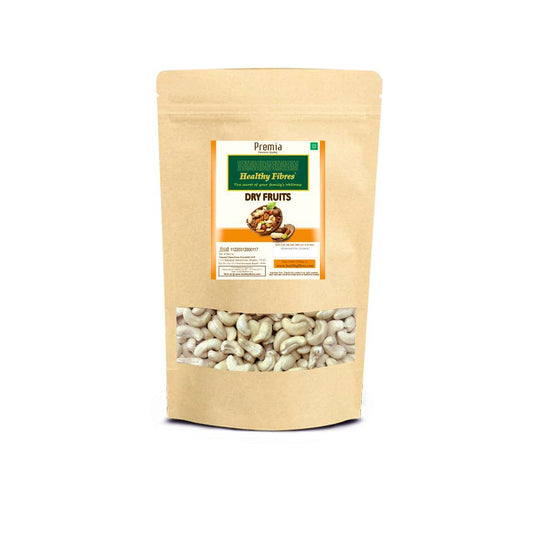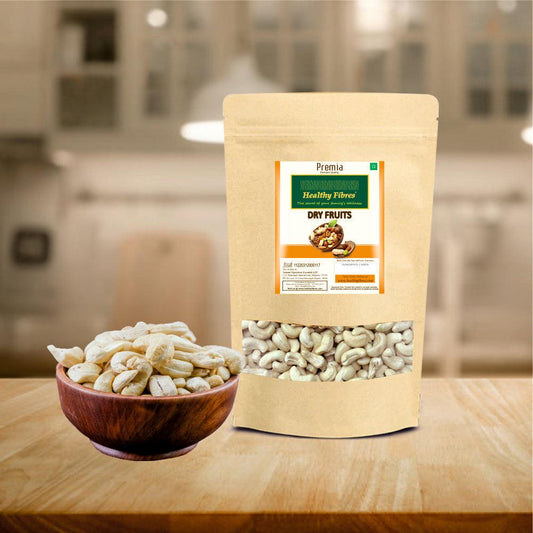Cashew, scientifically known as Anacardium occidentale, is a popular nut that is enjoyed worldwide for its delicious taste and numerous health benefits. Originally native to northeastern Brazil, cashew cultivation has spread to various tropical regions around the world. In this article, we will explore the nutritional value of cashews, their health benefits, and delve into how they are grown in India, one of the largest producers of cashews globally. Nutrition: Cashews are not only tasty but also packed with essential nutrients. They are a rich source of healthy fats, primarily monounsaturated fats, which have been linked to improved heart health. Additionally, cashews are a good source of dietary fiber, protein, and various minerals such as magnesium, phosphorus, and zinc. They also contain vitamins like vitamin E and vitamin K, which are beneficial for overall well-being. Per 100 grams, cashews have the following approximate nutritional composition: Calories: Approximately 553 calories Carbohydrates: Around 30 grams Protein: Roughly 18 grams Fat: Approximately 44 grams, predominantly healthy unsaturated fats Fiber: Approximately 3 grams Health Benefits: Consuming cashews can provide several health benefits. Due to their high content of monounsaturated fats, cashews can help lower "bad" LDL cholesterol levels, reducing the risk of heart disease. The presence of antioxidants in cashews, such as vitamin E and selenium, helps protect cells from oxidative damage caused by free radicals. Cashews also contain compounds like phytosterols and polyphenols that have anti-inflammatory properties, potentially aiding in reducing chronic inflammation in the body. Cashews are known to support healthy brain function as they contain nutrients like magnesium, copper, and antioxidants that contribute to cognitive health. Moreover, the high magnesium content in cashews can help regulate blood pressure levels and promote bone health. The presence of dietary fiber aids in digestion and may contribute to weight management. Cashew Cultivation in India: India is one of the leading producers and exporters of cashews globally. The cashew tree is primarily cultivated in the coastal regions of India, including states like Kerala, Karnataka, Goa, and Maharashtra. The favorable tropical climate of these regions provides optimal conditions for cashew tree growth. The cultivation of cashews involves a series of stages. Cashew trees require well-drained sandy or loamy soil and thrive in areas with an annual rainfall of around 1,000 to 2,500 mm. The trees are typically propagated through grafting or budding techniques. After planting, it takes approximately three to five years for the trees to start bearing fruit. Cashew fruits, known as cashew apples, are pear-shaped and develop at the end of a cashew tree's branches. The cashew nut is enclosed in a hard shell, which is attached to the bottom of the cashew apple. After harvesting, the nuts are carefully extracted from the shells, and the shells are used for various purposes such as fuel or as a raw material for manufacturing. Once the nuts are extracted, they undergo a series of processes like drying, roasting, and shelling to make them suitable for consumption. The cashews are then sorted, graded, and packed for distribution to local and international markets. Conclusion: Cashews are not just a delicious snack but also offer numerous nutritional benefits. Their consumption can contribute to heart health, brain function, and overall well-being. India, with its favorable climate, plays a significant role in cashew cultivation, making it one of the largest producers and exporters of cashews worldwide. So, next time you enjoy the buttery taste of cashews, remember the nutritional value they provide and the journey they undergo from the tree to your plate. MINI COLLECTION Raw Cashew: Raw cashews refer to cashew nuts that have not undergone any roasting or processing. They have a mild and creamy flavor, making them versatile for use in various recipes. Raw cashews can be used in salads, stir-fries, baking, or even enjoyed as a healthy snack. Roasted Cashew: Roasted cashews are raw cashews that have been heated to enhance their flavor and texture. The roasting process gives them a rich and slightly nutty taste, along with a satisfying crunch. Roasted cashews are a popular snack on their own and can also be used in recipes like trail mixes, desserts, or as toppings for salads. Cashew Butter: Cashew butter is a smooth and creamy spread made from ground cashew nuts. It is a nutritious alternative to traditional nut butters like peanut butter. Cashew butter is rich in healthy fats, protein, and minerals. It can be spread on toast, used as a dip, or incorporated into recipes for sauces, dressings, and desserts.




